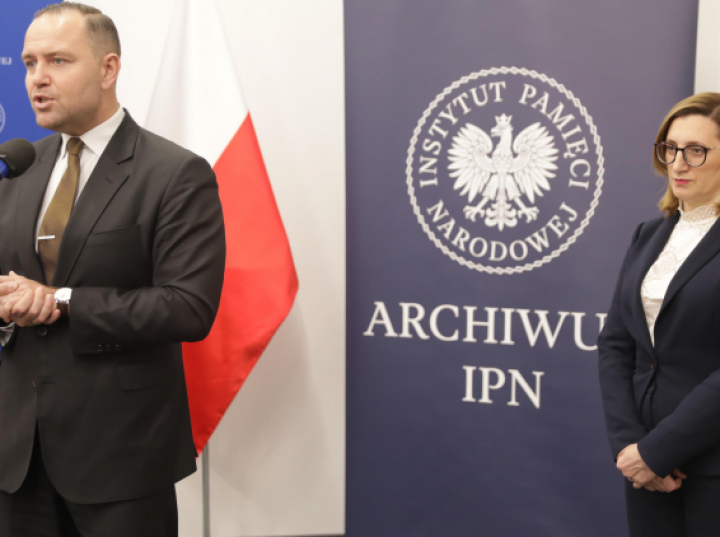These documents reveal a specific genotype of Poles involved in various forms of social, political and local government activity, serving important values in the cave of a totalitarian system – the president of the Institute of National Remembrance, Dr. Karol Nawrocki, to PAP, Monday.
In a press conference following the signing of the ZPwN archive transfer agreement, the president of the Institute of National Remembrance pointed out that these resources are proof of the permanent presence of Poles in Germany. “The Association of Poles in Germany was founded almost a hundred years ago. At that time we had gathered 32,000 of our colleagues. “Even so, the Association cares about Polish cultural heritage, Poland is involved in social, cultural and political life,” he stressed. He added that the coming to power of the National Socialist Party did not change their attitude, but led to increased repression against the organization. He added that after the outbreak of World War II, 1,200 Union activists were deported to German concentration camps, where “they died because of their attachment to their homeland.” He stressed that “the memory of their actions cannot be killed.” “By providing these materials, their history will never be forgotten,” concluded President Karol Nawrocki.
“We have been trying for years to transfer these documents of national memory to the institutions that will take care of them. The memory of the Polish people who created this unique Association must be preserved,” said Anna Wawrzyszko, vice president of ZPwN. He recalled that the Polish Association in pre-war Germany was “a state within a state” because its activities encompassed almost the entirety of social life. “In this way, he showed that Polish society is a mature society, even in such difficult conditions,” he stressed.
As part of the cooperation between IPN and ZPwN, the entire archival resources of the Polish Association in Germany, consisting of several hundred meters of documentation, will be transferred to the institute’s archives. The Institute of National Remembrance has worked to organize the material, preserve it, and digitize it. Once the process is complete, all ZPwN archive sources will be available to interested parties. Anna Wawrzyszko told PAP that among the submitted documents, the personal archives of the activists deserved special attention, as they showed the ZPwN’s continued operations after 1945, even though all property confiscated by the Third Reich had disappeared. “Despite everything, this is a perfectly functioning organization. “This archive refutes the thesis that Poland became invisible after 1945,” he stressed.
“The importance of these documents is crucial for understanding the attitudes of the Weimar Republic and the Third Reich towards the Polish minority before 1939. These documents reveal a particular genotype of Poles who were involved in various forms of social, political and local governmental activity, serving the values of important value in the cave of a totalitarian system,” he told PAP. Dr. Karol Nawrocki. According to him, modern Germany’s approach to many problems is the same as in the interwar period. “These documents and the current situation of Polish society show a certain continuity in the situation of the Polish minority, which does not have complete rights. At that time, it was difficult for Poles to run their businesses, and today they do not have the privileges that Germans have in Poland,” said the president of the Institute of National Remembrance.
The Association of Poles in Germany was founded on 22 August 1922 as the heir to all organizations of Poles living in the former Prussian divisions and in Germany. The organization carried out cultural, social and economic activities, looked after the Polish minority, which at that time numbered one million, and attempted to represent the interests of other national minorities before the German authorities.
On his initiative, various types of social organizations were founded, including: the Association of Polish Cooperatives and the Association of Polish School Societies. Since 1933, the symbol ZPwN has been the Rodło sign. The union operates throughout Germany, divided into five districts. According to data from the first year of operation, in the Opole-based District I, including the so-called Opole Silesia, namely the part of Upper Silesia that fell to the Germans after the vote, the Association has more than 5,000 members. The organization was banned by German authorities in 1940, and its activists became victims of repression. The Germans killed many of them and imprisoned more than a thousand in concentration camps. The ZPwN resumed its activities in Germany in 1945. To date, Poles have not regained their status as a national minority in Germany, nor have their stolen property been returned.
Author: Michał Szukała
pat/

“Reader. Future teen idol. Falls down a lot. Amateur communicator. Incurable student.”


![Bogusław Wołoszański: “Achieving nuclear weapons would be the beginning of World War III” [WYWIAD]](https://storage.googleapis.com/bieszczady/rzeszow24/articles/image/877236c0-66fd-457a-9eb4-41792f9077ff)




